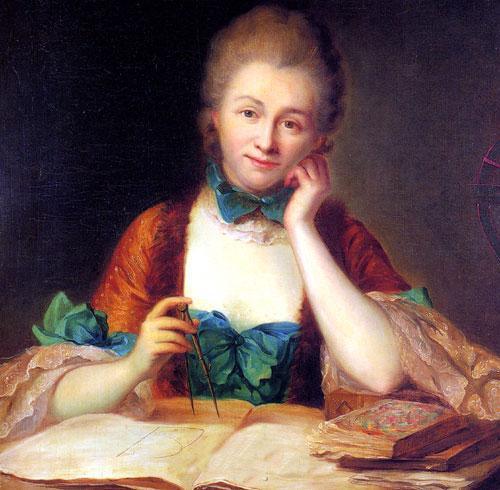

I’ve always been something of a history nerd. I come from a long line of history teachers, so I grew up watching Ken Burns’ documentaries, voraciously consuming books about historical figures, and enduring my father’s repetitive jokes about the battle strategies of the French. What most fascinated me, though, was the ever-evolving role of women in history, from Queen Elizabeth to Sacajawea to Carrie Nation to Eleanor Roosevelt.
As I grew up, I began to pursue my creativity passions: the theatre! Through my career, I have created a handful of theatrical projects stemming from history or relating to historical figures in some way.
My itch was truly scratched when I moved back to my adopted hometown of Chicago, met local artist and writer Jyl Bonaguro, and signed on to direct a workshop of her new play Urania: The Life of Emilie du Chatelet.
I knew nothing of Madame Emilie until I received Jyl’s script, an epic covering dozens of years in 18th Century France. Reading through the script and researching Emilie’s life, I was stunned that I had never heard of this amazing woman. That she had become somewhat of a footnote of history, remembered more for her salacious love life instead of her ground breaking work as a scientist and translator, seems almost a crime.
Emilie grappled with the works of Sir Isaac Newton and John Locke, providing commentary and criticism on some of the most widely accepted ideas of the time. She bucked the contemporary style of watering down writing for a female audience (Newton for the Ladies, for example), and unabashedly wrote at a high level directed to an audience of both sexes. And she was very public about all of it. She sought publication, submitted letters of dissent to academic journals, and conducted scientific experiments in her home. Her exploits were widely known throughout France.
Our play chronicles her life, her works, and her loves, the most notable and tempestuous being Voltaire, the scathing writer and philosopher. What I adore about Emilie’s story and this script is that she is unapologetic. She is unashamed of her desires, whether she wants to create lasting work, be published for all to read, or immerse herself in a passionate relationship. I see myself in Emilie, particularly in the insatiable drive that moves her through work and love.
She eventually died due to complications of childbirth, as her last pregnancy occurred when she was forty-two, an incredibly dangerous scenario at the time. The infamy she had gained in life soon wore off with her death, and her name is now barely recognized in popular culture or history.
We hope this play can reveal her story and spread it further, a stone producing infinite ripples.
For more information about the play, visit the Facebook page here.
You can find out more about Emilie’s life here.
This post originally appeared on the Sheroes of History blog. Sheroes of History is an exciting project telling the fascinating stories of history’s forgotten heroines. The aim of the blog is to raise the profile of these incredible women and provide a broad range of inspiring role models for girls growing up today. If there is a Shero you would like to write about for the site you can get in touch and submit your idea. Follow Sheroes of History @SheroesHistory and like them on Facebook for loads more women’s history updates! This week’s post is written by Eileen Tull, who is directing a workshop of a play about Emilie du Chatelet’s life. Eileen is a performance artist, writer, and theatre creator. You can follow her on Twitter @Tullie23